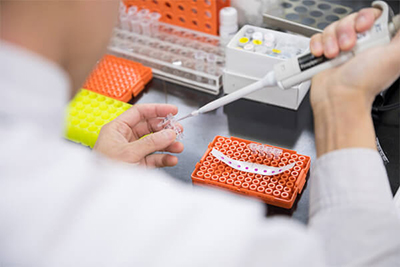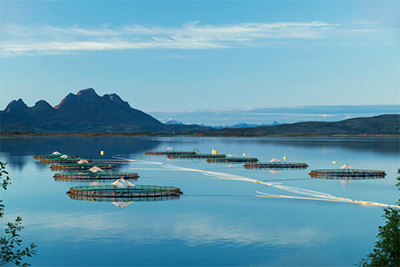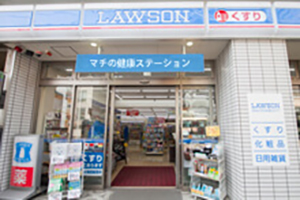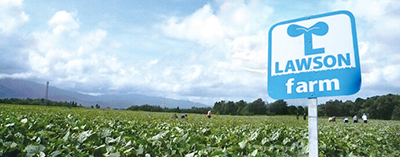MC engages in responsible advertising and marketing in line with the Three Corporate Principles, MC’s core philosophy, as well as with the Corporate Standards of Conduct, the Social Charter and the Code of Conduct. Through its corporate communications activities, MC strives to raise its brand value by conveying accurate information to the public while at the same time receiving feedback from external stakeholders with humility and incorporating it into business activities.
In order to present a consistent corporate image to customers and conduct advertising and promotional activities with the appropriate messaging, content and media, MC has developed a set of internal rules, guidelines and manuals that include specific considerations and stipulate approval and reporting procedures and other important matters. In particular, we take adequate precaution with respect to slanderous or discriminatory expressions, religious and political creeds, the environment, third-party privacy, confidentiality, disclosure and intellectual property rights. We have also created manuals for MC Group companies to ensure consistency across the Group.
MC engages in responsible marketing in a manner that respects third parties and their reputation. We use information and language that is easy to understand and make sure to avoid any potential for misunderstandings with our customers. This is accomplished by complying with laws and regulations related to marketing (such as the Japanese Unfair Competition Prevention Act), formulating and complying with internal rules, and conducting training, etc.
While the MC Group conducts business in a variety of areas, the food products business is most directly connected to consumers. The products we handle also cover a broad range and include processed foods, fresh foods, and beverages. For this business, we have established value chains that cover activities ranging from raw material procurement and processing to product manufacturing, distribution and retail. MC aims to meet the needs of an increasingly diverse and sophisticated consumer group and to respond to mounting concerns over food safety and security. As we develop businesses closely connected to people’s daily lives, it is essential for the growth of the MC Group that we provide products and services that add value for our consumers and that we obtain feedback directly from consumers through our retail businesses including MC affiliate Lawson, Inc. Consumer feedback is reflected back into our raw material procurement and processing, product manufacturing and distribution. Through this process, MC is optimizing and driving forward its businesses with a "consumer-first" mindset. In promoting consumer-related businesses, MC recognizes the issues involved (see below) and will conduct initiatives to prevent the occurrence of incidents and to mitigate their impacts.
The MC Group conducts business activities globally which involve providing consumers with food products and medical services. From upstream raw material procurement to downstream retail, we provide a stable supply of products and services that meet consumer needs in order to help them lead rich and varied lives. With a mission of conducting business activities closely connected to food and medicine, MC strives to ensure safety and security for consumers, thereby providing value that meets social requirements while also contributing to improved access to better nutrition and medical care.
In emerging countries, nutrient imbalances caused by lifestyle changes, increasing obesity, other lifestyle-related diseases and lower nutrient intake due to eating difficulties caused by aging have all become broad social issues. In emerging countries, hunger and malnutrition brought on by poverty and other conditions are widespread. At the same time, people are becoming more health-conscious. Each of these trends has the potential to create new markets and generate business opportunities, especially in emerging countries. The MC Group recognizes these social issues, and by leveraging the strength of our value chains which range from raw materials to retail as well as our technical capacities in the food science business, we will work to improve, for example, nutrition for elderly people who are nutrient deficient, etc., and to develop and provide nutritious products that meet consumer needs. Furthermore, we will strive to maintain a stable supply of products to prevent consumers from being negatively impacted by supply disruptions.
The MC Group is undertaking healthcare-related businesses through its S.L.C. Group. In Japan, one pressing issue is that government finances are being strained by worsening business conditions faced by medical institutions and burgeoning social insurance costs, which in turn reflect the aging population and growing medical expenditures. Meanwhile, in emerging countries, many people lack access to high-quality medical services due to underdeveloped healthcare environments and systems. Leveraging the knowledge and networks developed through its healthcare-related businesses over many years, the MC Group is working to address various healthcare issues arising worldwide, with the aim of realizing a society with improved access to better healthcare.
Lawson, Inc., an MC affiliated company, maintains non-alcohol sales areas, works to prevent underage drinking and drunk driving, and raise awareness of the benefits of moderate drinking in order to reduce the health risks caused by drinking and other lifestyle-related factors. The Ministry of Health, Labor and Welfare's (MHLW) guidelines define "alcohol consumption that increases the risk of lifestyle-related diseases" as a daily net alcohol intake of 40 g or more for men and 20 g or more for women. To keep alcohol intake to 20 g or less, the alcohol content of 350 ml cans, which is the standard size for canned “chuhai,” must be below 7%, and the alcohol content of 500 ml cans of beer, often purchased at convenience stores, must be below 5%.
Lawson develops and sells original “chuhai” and beer that prioritize deliciousness in accordance with the MHLW guidelines.
Lawson is characterized by its great variety of products and services it offers, which at the same time means that it must adhere to laws as well as both anticipate and respond to risks. Lawson’s “Basic Policy for Improvement of Internal Control Systems” has been established to strive for healthy, continuous growth with these business characteristics. Japanese consumer laws (such as the Food Labeling Act, the Food Sanitation Act and the Health Promotion Act) are held as important laws that need especially to be followed as common knowledge in order to reliably improve systems to ensure Lawson’s indispensable product safety and security, as well as to maintain consumer trust. Thus, Lawson attaches labels to its original lunchboxes and prepared foods in compliance with the Food Labeling Act indicating the product name, expiration date, ingredients, etc.
Moreover, the Intellectual Property Act and other laws are taken into consideration in order to further strengthen Lawson’s label-checking system so as not to violate the intellectual property rights (trademark rights, copyrights, etc.) of others when creating promotional materials.
Furthermore, Lawson publishes information about these in its Integrated Reports.
Lawson conducts compliance and risk management training for all employees every year and aims for further improvement of ethical awareness and crisis-response capability. Compliance is also included in the training when employees join Lawson or are promoted to managerial positions, training by job category, as well as management training. Moreover, by revising the content of this training in accordance with changes in the status of risks, Lawson is working to improve operations by having employees in all positions and job categories share their problems.
Furthermore, Lawson publishes information about the aforementioned on its homepage.
MC consolidated subsidiary Mitsubishi Shokuhin Co., Ltd. engages proactively in the sale of non-alcoholic beverages in order to reduce the harmful effects of excessive alcohol consumption.
In addition to upholding advertising guidelines, Mitsubishi Shokuhin conducts employee training on the relevant Food Labeling Act and Act Against Unjustifiable Premiums and Misleading Representations every year.
Mitsubishi Shokuhin agrees with Japan Food Safety Management Association and collects information on Quality Management System (QMS) and the Food Safety Management System (FSMS) to use when providing guidance to contracted manufacturing companies.
MC’s goal in the life sciences field is to become the world’s leading company in the field. We will achieve this by sustaining growth and establishing a robust presence in the food and health sector by further developing the Japanese domestic market through strategic investment and innovative R&D based on our technical capacities, as well as through the provision of safe and reliable products.
Given the global presence of the MC Group, MC discloses information through its corporate websites in seven languages*Including websites of overseas subsidiaries* (Japanese, English, Chinese, Portuguese, French, Russian and Korean), and annually releases its corporate brochure in six languages (Japanese, English, Chinese, French, Russian, and Spanish). The goal is to ensure accurate information disclosure to audiences around the world.
MC has created a Frequently Asked Questions (FAQ) page on its corporate website, and strives to respond to inquiries as quickly as possible. In addition, the relevant divisions promptly address customer inquiries via the Head Office’s main telephone line.
Mitsubishi Corporation Life Sciences Limited develops and manufactures seasoning, health-functional materials, and cosmetic ingredients that harness the power of microorganisms, primarily yeast. In response to future food challenges associated with population growth, the company is engaged in the "development of microbial-derived protein ingredients" and "ingredient proposals for plant-based foods," along with "application proposals to enhance flavor." In the field of extending healthy lifespans, they are advancing initiatives such as "development of health and beauty ingredients," "solving dietary challenges for health maintenance (e.g., delicious and healthy options)," and "expansion into medical and caregiving sectors." The company aims to contribute to global well-being in the areas of food, health, and beauty through sustainable, safe, and reliable production practices, including the effective use of untapped resources.
For more details, please refer to the website below.

In the food-related business, which is directly linked to consumers, the MC Group is working to address various related challenges through its business.
Cermaq (salmon producer), an MC subsidiary, considers the provision of healthy and sustainable food to be its core mission. Cermaq has the ambition to produce healthy and nutritious food to a growing world population and play a role in improving the global food system by engaging in multi-stakeholder partnerships. Farmed salmon is one of the richest sources of omega-3 fatty acids, which are fundamental for the formation and functionality of the nervous system and known to help lower the risk of cardiovascular disease. Food safety remains the highest priority within Cermaq. It is also at the core of the expectations of our customers and consumers. Ensuring food safety is deeply integrated into the daily operations of key business functions including the farming, harvesting, processing and distribution of farmed salmon. Cermaq considers salmon farming as part of the solution to solving the world’s food needs and engages actively in partnerships to build best practice and share knowledge across the food industry.

Lawson, Inc., an MC affiliate company, manages and operates convenience stores. Lawson is closely connected to consumers within the food products value chain, and conducts the following initiatives.
Lawson is committed to supporting healthy and long-lived lifestyles, something which is possible because it is a convenience store that is aspires to be is ‘”close”’ to its customers, and makes them feel confident in the knowledge that there is always a Lawson nearby. Lawson has introduced a "Meal Solutions" initiative which aims to provide healthy everyday food. This initiative offers a wide range of meals, makes these meals convenient to purchase, and takes into account health considerations. Thus, it is highly rated by consumers who want not only quick and easy meals but also to pursue or maintain a healthy diet. Additionally, Lawson offers “self-medication support” towards those who are concerned about their own health in order to help customers maintain good health by offering consultation services.

Lawson’s subsidiary SCI, Inc. oversees Lawson’s supply chain management and is responsible for supplying original products that are also safe and reliable. SCI conducts rigorous quality assessments, and in procuring raw materials only selects ingredients that have passed a strict screening process based on Lawson’s quality control standards. In the product manufacturing process, for example at plants that produce rice products, a unique system for food sanitation management that includes a recommendation to obtain JFS-B certification, a Hazard Analysis and Critical Control Point (HAACP) standard originating in Japan, has been established to prevent incidents involving food poisoning or contamination. In this way, Lawson procures safe raw materials and carries out rigorous quality control to prevent any negative health impacts on consumers. Furthermore, Lawson has established the "Lawson Farm" project, which provides stable supplies of fresh fruits and vegetables that are safe, reliable and high quality to stores in the Lawson Group. As of January 31, 2023, there are 16 LAWSON Farms in Japan, all of which are working to acquire JGAP and ASIAGAP*GAP: Good Agricultural Practice
LAWSON Farms will acquire regular Japanese JGAP and international-standard ASIAGAP* certification.

Lawson's products are labeled with food labels in compliance with the law. Lawson is also working to display allergen information on its website for its original products.. The labeling information is checked internally and by external organizations to ensure customer safety.
In order to prevent the sale of alcoholic beverages and cigarettes to those under 20 years of age (the legal age for drinking and smoking in Japan), Lawson displays a notice on the screen visible to customers on the point of sale (POS) cash register explaining that the sale of alcoholic beverages and cigarettes to those under 20 years of age is prohibited. At the POS, customers who appear to be under 20 years of age are asked to confirm their age with an ID card. In addition to providing regular training for store employees, Lawson displays posters and makes in-store announcements to encourage understanding and cooperation from customers.
From crime prevention and disaster preparedness to safety measures and children’s health initiatives, there is an ever-increasing expectation for convenience stores to play a broader role in society. To meet these expectations, the Lawson Group participates in the Safety Station activities of the Japan Franchise Association, helping to build safe and secure communities and promoting healthy environments for young people. Lawson also implements anti-crime measures to combat theft and other crimes, while also supporting women and children who seek safe harbor in-store.
When people with food allergies consume an allergen it can trigger anaphylaxis. Similarly, consuming large quantities of certain substances can potentially damage one’s health. To prevent such problems, the MC Group strives to label its food products in a way that is easy to understand in accordance with applicable laws and regulations. To ensure that consumers understand product characteristics and are in a position to make appropriate purchasing decisions based on health and other factors, Mitsubishi Shokuhin Co., Ltd., Lawson, Inc. and other MC Group companies make it a top priority to comply with laws and regulations such as Japan’s Food Labeling Act. These companies provide information which is easy to understand from the consumer standpoint such as, warning against underage drinking and drunk driving, clear allergen warnings.
Offering low-carbohydrate/high protein/fiber-rich breads and sweets as well as Natural Lawson brand products that take into account calorie and salt content.
Lawson, an MC affiliate company, offers health-conscious products such as Bran Bread and sweets, which are low-carbohydrate but still delicous, salads that are a good source of protein, and rice balls that are a good source of dietary fiber.

In addition to striving for nutrition information labels that are easy for consumers to understand, Mitsubishi Shokuhin is also working to develop health-conscious Karada Shift products.

As a company engaged in the healthcare sector, MC is involved in the following initiatives with its Group companies to help provide people in Japan and around the world with better access to healthcare.
A subsidiary of MC Healthcare Holdings, Inc., (a MC consolidated subsidiary in Japan) is contributing to the improvement of hospital operations as well as the enhancement and stability of domestic medical systems through procurement and inventory control of medical supplies and equipment, group purchasing and development/import/sales of medical equipment.It is also applying its experience and expertise in the rapidly growing Chinese market. Nippon Care Supply Co., Ltd. is a pioneering provider of rental welfare equipment and in-home nursing care services. In order to raise the quality of life of the elderly and enable them to continue living independently in their accustomed area, Nippon Care Supply conducts its core business of renting welfare equipment as well as other businesses including providing meals to day service facilities and other institutions. In doing so, Nippon Care Supply is contributing towards a healthy longevity society where all senior citizens can live comfortably and with peace of mind.
As a convenience store closely connected to consumers, Lawson, Inc., an MC affiliate comapny, is focusing on the sale of pharmaceutical products in order to provide convenience to customers in an aging society and to curb national healthcare costs. In regard to pharmacy services provided under health insurance, since 2003 we have been working on the development of stores with drug dispensing pharmacies on the premises with the aim of creating community pharmacies. In addition, from the perspective of promoting self-medication, we have been fostering alliances with drug dispensing pharmacies and drugstore chains throughout Japan, and handling over-the-counter medicine (non-prescription drugs) in our stores. In addition, as a Lawson exclusive initiative based on “community,” some of our stores offer onsite health checkups and machikado (street corner) community health consultations. In cooperation with local governments, health checkupscheck-ups and consultations, which were previously conducted at government offices and community centers, are now available at convenience stores, a more familiar and accessible location for residents.
Cermaq, an MC subsidiary, engages in external sustainability initiatives in line with its strategy, which emphasizes partnerships to find solutions for salmon and seafood sector inline related to the UN Sustainable Development Goals (SDGs). In particular, three goals have been identified as high priority for Cermaq, including Goal 2: Zero Hunger, Goal 13: Climate Action, and Goal 14: Life Below Water. Cermaq engages in industry and multi-stakeholder initiatives to find solutions, on different levels.
Examples of initiatives include:
GSI is a leadership initiative established by global farmed salmon producers. It seeks to provide a highly sustainable source of healthy protein to feed a growing global population, in tandem with minimizing the environmental footprint, and continuing to improve the industry’s contributions to society.
Seafood Business for Ocean Stewardship. Established in 2016 by nine of the world’s largest seafood companies (including Cermaq, Thai Union, Nissui, Maruha Nichiro, and Mowi) working together with leading scientists across disciplines and universities, to explore transformative risks and opportunities to promote sustainable seafood operations and ensure a healthy ocean.
Each country has local challenges, needs and responsibilities, reason why each operation companies, has also participation in and working through industry associations is an integral part of our engagement efforts.


